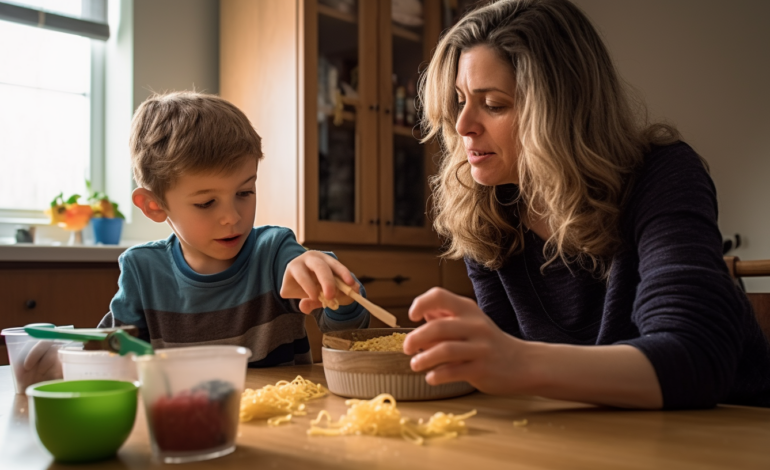
Effective Co-Parenting Tips: Maintaining Communication with Your Child’s Other Parent
Welcome to our comprehensive guide on effective co-parenting tips for maintaining communication with your child’s other parent. Co-parenting can be challenging, especially when it comes to keeping lines of communication open with an ex-partner. However, effective communication is essential for the well-being of your child and can help avoid conflicts and misunderstandings.
Whether you are going through a separation or dealing with co-parenting challenges, this guide will provide you with practical tips and advice on how to maintain good communication with your child’s other parent. We’ll cover everything from creating a communication plan to positive interactions, consistent schedules, shared calendars, open dialogue, and effective communication.
Why Maintaining Communication with Your Child’s Other Parent Is Important
Co-parenting can be challenging, but it is crucial for the well-being of your child. When parents work together effectively, children are more likely to feel secure and loved. They also benefit from consistent parenting styles and routines that promote stable environments.
Effective co-parenting also helps avoid conflicts and misunderstandings that can negatively impact children’s mental health. It allows both parents to stay informed about their child’s needs and activities while promoting healthy relationships between parents and children.
Create a Communication Plan
The first step in maintaining good communication with your child’s other parent is creating a communication plan. This plan should outline how you will communicate about your child’s needs, activities, schoolwork, medical issues, and any other relevant information.
A communication plan should be tailored to suit the needs of both parents and the child. It should include preferred methods of communication such as phone calls, emails, text messages or in-person meetings. It should also include how often you will communicate and what topics you will cover during each conversation.
When creating a communication plan, it is essential to be flexible and willing to make changes as needed. Both parents should agree on the plan and be willing to stick to it to ensure effective communication.
Positive Interactions
Positive interactions between co-parents can help maintain good communication and create a healthy environment for your child. Even if you have had conflicts in the past, it is important to remain civil and respectful when interacting with your child’s other parent.
Avoid talking negatively about your child’s other parent in front of them, as this can cause unnecessary stress and anxiety for your child. Instead, focus on positive interactions such as sharing stories about your child’s achievements or discussing their interests and hobbies.
It can also be helpful to attend events together, such as school plays or sporting events. This shows your child that both parents are interested in their lives and are willing to work together for their benefit.
Consistent Schedule
A consistent schedule is essential for effective co-parenting communication. It helps avoid conflicts and ensures that both parents are aware of their responsibilities regarding childcare.
Create a schedule that works for both parents, taking into account work schedules, extracurricular activities, and other commitments. Stick to the schedule as much as possible, but be willing to make changes when necessary.
If you need to make changes to the schedule, communicate these changes with your child’s other parent as soon as possible. This helps avoid misunderstandings and ensures that everyone is on the same page.
Shared Calendar
A shared calendar can be a useful tool for maintaining good communication with your child’s other parent. It allows both parents to stay informed about their child’s activities, appointments, and other commitments.
You can use a physical calendar or an online tool such as Google Calendar to share information. Be sure to include all relevant information, such as school schedules, extracurricular activities, medical appointments, and other commitments.
Make sure that both parents have access to the calendar and that it is updated regularly. This helps avoid conflicts and ensures that everyone is aware of their responsibilities regarding childcare.
Open Dialogue
Open dialogue is essential for effective co-parenting communication. It allows both parents to express their concerns and opinions in a respectful and non-judgmental way.
When communicating with your child’s other parent, it is important to listen actively and respond in a respectful manner. Avoid interrupting or dismissing your child’s other parent’s opinion, as this can cause unnecessary conflicts.
If you have concerns or disagreements, express them in a calm and respectful manner. Try to find common ground and work together to find solutions that benefit your child.
Effective Communication
Effective communication is essential for maintaining good communication with your child’s other parent. It involves being clear, concise, and direct when communicating about your child’s needs and activities.
When communicating with your child’s other parent, be sure to use clear language that avoids confusion or misunderstandings. Avoid using negative language or making assumptions about the other person’s intentions or feelings.
If you are having trouble communicating effectively with your child’s other parent, consider seeking the help of a mediator or counselor. These professionals can help you develop effective communication skills and work through any conflicts or challenges you may be facing.
Conclusion
Maintaining good communication with your child’s other parent is essential for effective co-parenting. It involves creating a communication plan, positive interactions, consistent schedules, shared calendars, open dialogue, and effective communication.
Remember that effective co-parenting is about putting your child’s needs first. By working together and maintaining good communication, you can create a healthy and stable environment for your child to thrive in.
We hope that this guide has provided you with practical tips and advice on how to maintain good communication with your child’s other parent. Remember to be flexible, respectful, and willing to work together for the benefit of your child.






